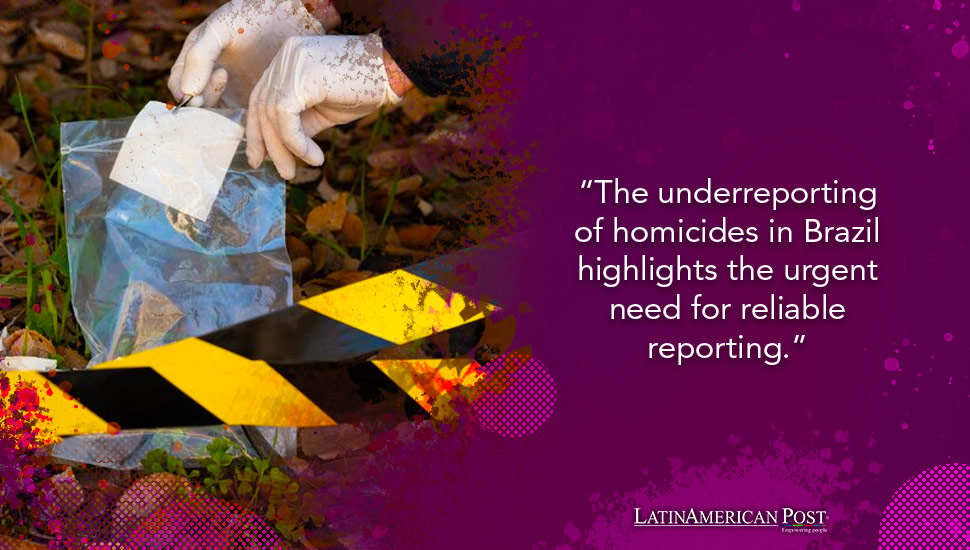Reliable Reporting Essential for Addressing Latin America’s Homicide Crisis

The underreporting of homicides in Brazil highlights the urgent need for reliable reporting. Accurate data is crucial for formulating effective policies to combat violence. Examples from across Latin America underscore the significance of transparency in addressing the region’s security challenges.
Recent revelations from the 2024 Atlas of Violence, compiled by the Brazilian Institute for Applied Economic Research and the NGO Brazilian Public Security Forum, have unveiled a startling statistic: between 2019 and 2022, at least 24,102 homicides in Brazil were not reported as such. This number represents 11.3% of all violent deaths during that period. The report estimates that there were approximately 213,700 homicides in those four years, but only 189,600 were officially recorded.
This discrepancy is a glaring example of the challenges faced in accurately documenting violent crimes. In 2022 alone, there were 46,409 reported homicides, but an estimated 5,982 went uncounted. Over the decade from 2012 to 2022, the number of unreported murders is estimated at 51,726. These are deaths not categorized as homicides by public authorities but are highly likely to be so.
Underreporting of homicides significantly affects public policy and safety measures. When authorities cannot define whether a death was due to homicide, accident, or suicide, the resulting ambiguity undermines efforts to address the root causes of violence. In the study, researchers analyzed 131,562 cases of violent deaths with undetermined causes from 2012 to 2022, finding that 51,726 were likely homicides not recorded as such.
In 2022, the recorded homicide rate in Brazil was 21.7 per 100,000 inhabitants. Including unreported homicides, this rate jumps to 24.5 per 100,000. Daniel Cerqueira, coordinator of the Atlas, emphasizes that this gap between recorded and estimated homicides influences regional authorities’ analysis and policy formulation.
A Regional Issue: Latin America’s Struggle with Accurate Crime Data
Brazil is not alone in facing these issues. Across Latin America, the underreporting and misclassification of violent crimes are widespread, distorting the accurate scale of the problem. In Mexico, for example, the infamous “femicides” often go underreported or are misclassified as suicides or accidents, masking the severity of gender-based violence. The lack of reliable data impedes the government’s ability to implement effective measures to protect women and combat violence.
In Venezuela, the political and economic crisis has exacerbated the problem of underreporting crimes. The country’s violent crime rate is among the highest in the world, yet many murders go unrecorded due to institutional corruption and the collapse of the public security apparatus. Without accurate data, it becomes nearly impossible to develop strategies to reduce violence and improve public safety.
The consequences of inaccurate reporting are far-reaching. Firstly, it hampers law enforcement efforts. With a clear understanding of crime patterns and hotspots, police forces can allocate resources effectively and implement targeted interventions. This inefficiency can lead to higher crime rates and a general sense of insecurity among the population.
Secondly, underreporting affects public perception and trust in institutions. When citizens perceive that crime is not accurately reported or addressed, their confidence in law enforcement and government institutions erodes. This mistrust can lead to lower cooperation with authorities, further complicating crime prevention and investigation efforts.
Thirdly, inaccurate data impacts international perceptions and relations. Countries with high reported crime rates may face challenges in attracting investment and tourism, which are vital for economic development. Conversely, underreported crime rates may give a false sense of security, delaying necessary reforms and interventions.
The Need for Transparent Reporting Systems
Latin American countries must invest in transparent and reliable reporting systems to address these challenges. Accurate crime data collection is crucial for developing effective public policies and ensuring accountability. Governments should prioritize the following actions:
Strengthening Institutions: Building robust institutions capable of accurately recording and analyzing crime data is essential. This includes training law enforcement personnel, improving forensic capabilities, and ensuring the independence of statistical agencies.
Implementing Technology: Leveraging technology can enhance data collection and analysis. For instance, digital reporting platforms and databases can streamline the process of recording and sharing crime information across different agencies.
Encouraging Public Reporting: Public awareness campaigns can encourage citizens to report crimes. Ensuring anonymity and protection for whistleblowers can also increase reporting rates.
International Collaboration: Regional cooperation can help standardize crime reporting methodologies and share best practices. International organizations and partnerships can provide technical assistance and funding to improve local capabilities.
Successful Reporting Reforms
Some Latin American countries have significantly improved crime reporting and data transparency. In Colombia, implementing the Integrated Information System for Citizen Security (SPOA) has enhanced the accuracy of crime statistics. This system integrates data from various law enforcement agencies, providing a comprehensive overview of crime trends and enabling more effective policy responses.
Chile has also made progress by creating the National Observatory of Crime. This institution systematically collects and analyzes crime data, offering valuable insights for policymakers and the public. By making this information publicly accessible, Chile has improved transparency and accountability in its approach to public safety.
These examples demonstrate that, with the right investments and commitments, significant improvements in crime reporting and public safety can be achieved.
The media and civil society play crucial roles in promoting reliable reporting. Investigative journalism can uncover discrepancies in official statistics and hold authorities accountable. Civil society organizations can advocate for transparency and support victims in reporting crimes.
Media outlets should prioritize accuracy and depth in their crime coverage, avoiding sensationalism that can distort public perceptions. By focusing on data-driven reporting, journalists can contribute to a more informed public discourse and pressure governments to address underreporting issues.
Civil society organizations, including human rights groups and community associations, can provide support and resources to victims, helping them navigate the reporting process. These organizations can also conduct independent research and publish findings highlighting official data gaps.
Building a Safer Latin America
Accurate crime reporting is not just a bureaucratic necessity but a cornerstone of public safety and trust in governance. The underreporting of homicides in Brazil and other Latin American countries highlights the urgent need for reliable data collection and analysis. Latin America can develop transparent and effective reporting systems by strengthening institutions, leveraging technology, and fostering international cooperation.
Also read: Inter-American Court Condemns Argentina for AMIA Bombing Failures
Media and civil society must also play active roles in this process, ensuring the public remains informed and engaged. The region can only address its security challenges and build a safer, more transparent future for its citizens through a concerted effort.





